I'm goin' down to the Greyhound Station, gonna buy a ticket to ride I'm gonna find that lady with two or three kids and sit down by her side Ride 'til the sun comes up and down around about two or three times Smokin' cigarettes in the last seat Sing this song for the people I meet Clay Pigeons -- Blaze Foley
I am writing this from the back of a Greyhound somewhere between Harrisburg and Pittsburgh. I’m clearly not in Brazil, like my last piece said I would be. I’ve been dealing with on and off again back problems since Lombardy, and it was very bad on the day of my flight, so I canceled1, but also my heart just wasn’t into it.2
I wrote two essays, one on buses, the other on returning to Brazil, and it’s the bus piece that made me nostalgic, so I'm at the beginning of a two-and-a-half-week trip to Chicago, via Harrisburg, Pittsburgh, Columbus, Indianapolis, Fort Wayne, South Bend, Michigan City, and Gary, which also means walking a fair share, from bus stop to motel, to restaurant, to bus stop.
I have a special fondness for drifting around the US with only a small backpack, a Greyhound schedule, and a few books, that the song Clay Pigeons captures3, which is almost all about “the people I meet,” even when it doesn’t go so well, and even when the meetings are limited to the small moments that come with a long bus trip.
Like the young mother who sat next to me in a bright red anime wig, her child clutching a pristine doll that mirrored her in every way but skin tone, who asked me what I do. When I said I write about the people I meet, she told me her story, a rags-to-not-yet-riches-but-that-will-soon-come tale, with the six years prior to the birth of her princess spent in Fox Gentlemen's Club, which she admittedly still dipped back into now and then when short of cash. The child's father doesn't like that, a statement she punctuated with a nod to a young man sleeping a row away clutching a Peppa Pig stuffie, an accessory that contrasted with his otherwise white-rapper-from-the-'90s look.
My last US journey was by car, but this one will be about buses, which as I wrote last week, allow you to see all of the country, landscape and people. This won’t be my first Greyhound trip I’ve written about, or the first I’ve taken to South Bend, but this time I plan to take it slower, hopping from town to town with no rides longer than five hours, for my back’s health, and because it’s a much more interesting way to see cities like Indianapolis.
Well, that's the plan anyway, based on lots of time spent looking over Greyhound's schedule to make sure I don't get dropped off in the middle of nowhere at 2 a.m. — a real risk these days as they sell off their downtown stations and move them to the Walmart plaza in the suburbs.
That is a company decision driven by an investment firm's need for quick cash, but it also makes some sense given their clientele, who draw heavily from the bottom of society.
Downtowns offer little for them now, especially in smaller towns, where the energy has shifted out towards the commercial plazas near the interstate, with the Home Depot, Starbucks, McDonald's, Walmart, and Flying J. That is also where the cheap motels are: The Super 8, Motel 6, and EconoLodge, run by a Patel family with half of the guests paying per month with state vouchers4.
So I set off yesterday for my first leg, a short five hours to Harrisburg via Allentown. My seatmate, Amadou, from Dakar, was going all the way to Pittsburgh. He was soft-spoken and polite, but knew little English. When he spoke to his mom in Wolof, which he did a lot, he spoke very loudly, so I moved.
Everyone else on the bus, a clichéd motley crew with a diversity (in everything but wealth) that would top any DEI bureaucrat's favorite metric, were unfailingly polite to me and each other, so much so it felt as if they knew the negative stereotypes of Greyhound riders and were going out of their way to change them.
Like Fred, a man my age returning from "five days of straightening out my parents' accounts in Philly. My pops, he's a good man, ex-military like me, still respect him, but his mind is not all there, and my mother, she's dealing with kidney issues and yet the house has no proper plugs." He's currently four seats behind me and wants to make sure I have a relaxing trip because he used to work for Greyhound before "he went into the military, which his pops had also done, and his pops' pops, that would be his grandad, who fought in the great war, not WWI, but WWII, because people of his color were not allowed to fight in WWI, which makes no sense at all when you think about it, because even if you hated someone based on color of their skin, you'd think you would sign them up to be shot at, now wouldn't you.”
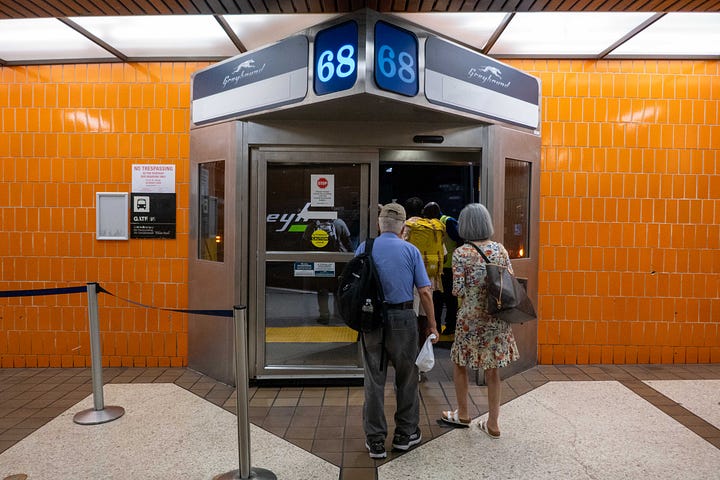
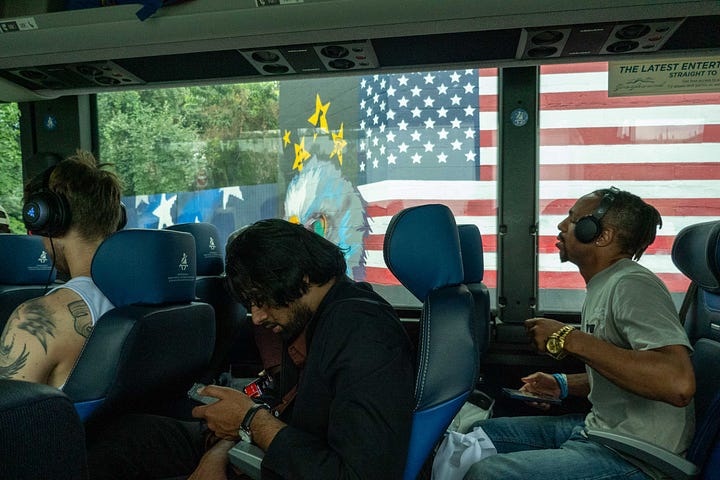
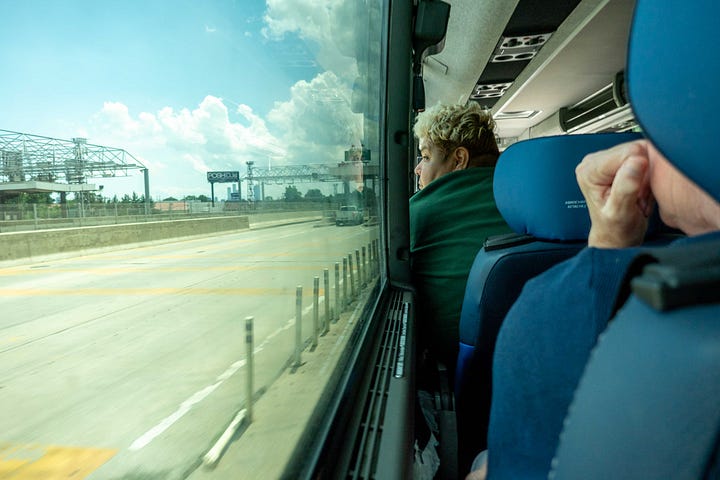
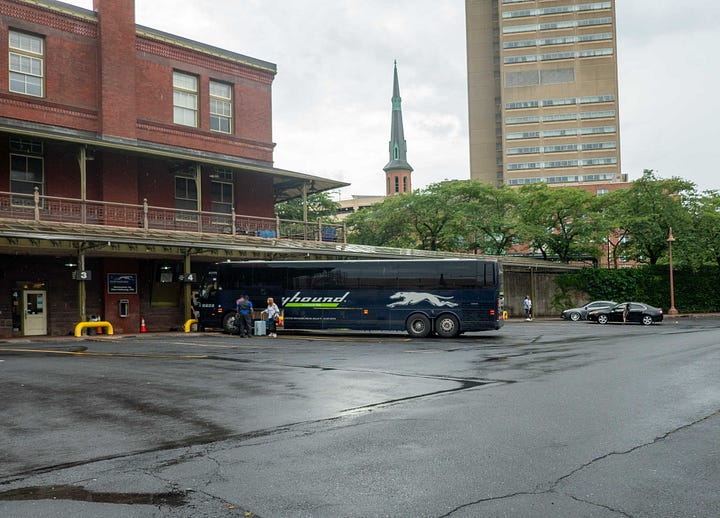
I had hoped to spend my single night in Harrisburg immersed in the good, by going to a minor league baseball game, in a stadium on an island I could walk to, but it rained the whole evening, so I was confined to downtown, around the station, and that was depressing.
What I found, walking from the station to a Mexican restaurant, and then back to my hotel, was an all-too-familiar scene of broken people, some twisted on the ground from drugs, others hustling so they could buy drugs, others wandering idly and high, all surrounded by the putrid smell of a urine, weed, and garbage concoction.
The worst was a couple sheltering in an underpass, high from K2, an awful drug that every person involved with manufacturing, distributing, and selling, should be prosecuted for. I spoke to them a little, but they were too far gone, mentally and physically, and while they wanted to pose for a portrait, something felt off about it all, so I handed them a few dollars and moved on.
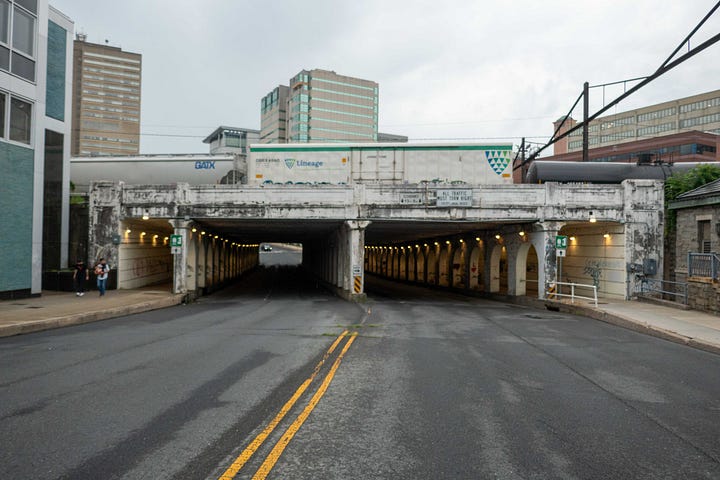
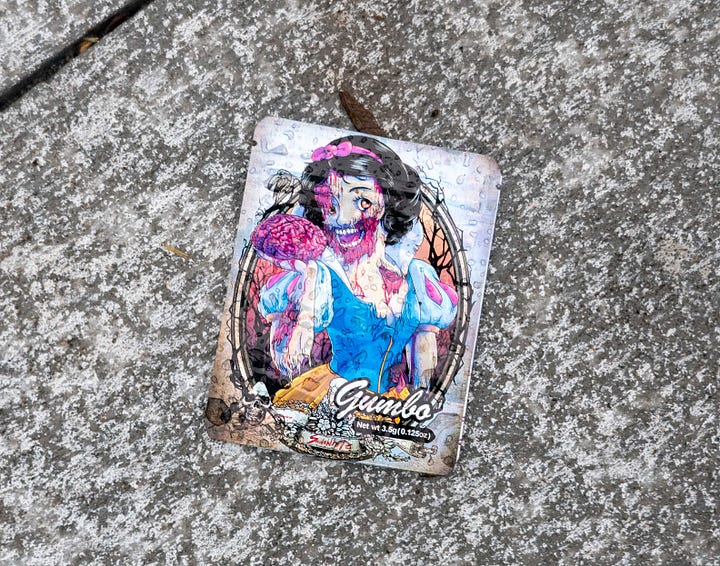


I woke at five a.m., and since there was no place near me to sit open before seven, I walked the three miles to the McDonald's, something I wanted to do anyway, to get a sense of a city I'd only seen until last night from a car. It wasn't a pleasant walk, or what I would expect anyone else to do, because I could have taken the bus.
There is an overwhelming uniformity to urban sprawl, a constant backdrop of prefab franchises with the occasional Mexican restaurant thrown in5, and this part of Harrisburg, the two-mile-thick layer around downtown, didn't distinguish itself in any way, other than the occasional section of very mid-Atlantic rowhouses or a liquor store in a two-story, clapboard-sided old home.
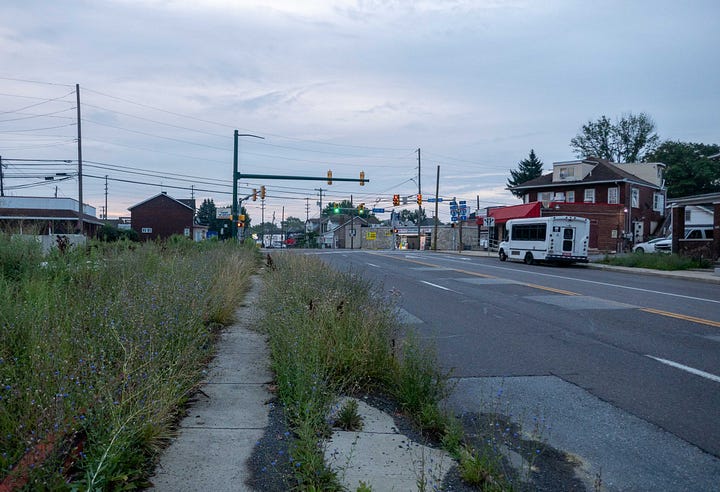

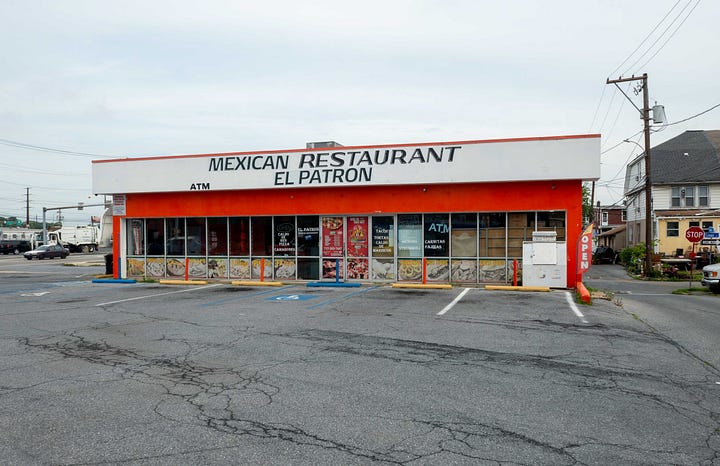
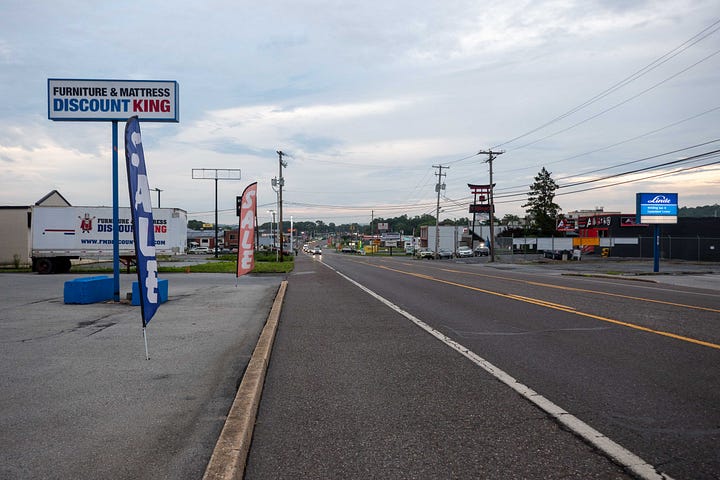
I had intended to take the local bus back, but the stop I waited at, a simple sign along the side of the road, was skipped by the driver who scolded me with as much intensity as you can possibly muster with a wave of the finger, and drove on. That happened again half a mile away, and this time a transit employee in a safety vest, standing on the bus, explained they skip stops in the middle of construction and that's where I was, but I countered that there wasn’t construction, only the detritus of past construction, and the bus was already four feet from me so what harm would come from letting me on (I had two dollars and seventy-five cents in exact change as the website said), but given that she was both the judge and prosecuting attorney, my argument was denied in a slam of the door and roar of the engines, well, given it was electric, more the subdued whir of its engines.
I did pass by the woman, the one collapsed from K2 the prior evening, again, sitting near the bus station, and when I waved to her she looked at me like I was the devil, so I moved on, not wanting to fuel whatever was torturing her.
It wasn't until I was boarding the bus to Pittsburgh a few hours later that it struck me that I was in Pennsylvania's state capital. Perhaps if it had not rained the night before, and I'd gone to the baseball game, slept in, and woken later and walked towards the capital, I would have had a much different impression, and this piece would be more positive. That was the intention, to not limit myself to the worst perspective. But arguably that would have been more of me placing my fingers on the scales than what I ended up doing.
In any town such as Harrisburg, you can have two very different experiences, one optimistic, the other pessimistic, and that is the defining feature of the US: a stark disparity where, while even the worst off are wealthier in material goods than most of the world, many of them are also living profoundly vacant lives.
How our worst off live is what defines the US experience, especially compared to the image we project to the rest of the world, and that is why I've long said you need to ride Greyhounds to understand it. You see both the inherent good in people, but you are also forced to see what they face: a huge void of meaning, an absence of the communal and transcendent.
That absence hits the lower classes, mentally ill, and slow the hardest. They have little 'point' in their life, certainly not spiritually. Ours is a cold, individualistic, and materialistic society, with little direction given beyond accumulating more, and those at the bottom have lost that race, something they are acutely aware of.
While they are hurting, they also shouldn’t have easy access to an array of nasty drugs (meth, heroin, and certainly not K26 ) to numb the pain, like the couple I saw collapsed under the bridge. The last decade's move to de-stigmatize and legitimize once-illegal drugs was well-intended and perhaps necessary at the time, but it has gone too far. I saw that last night in Harrisburg, and I’ve seen it all over the US, most starkly last year in Phoenix.
While everyone should be forgiven for a few mistakes, there comes a point when continual forgiving becomes the actual punishment.
I've watched as the recent wave of decriminalization has shifted people's attitudes toward themselves. They now believe they are doing nothing wrong—in fact, they often see their addiction as natural and even good—and will regurgitate warmed-over therapy platitudes that "it's not their fault. None of it. They are working through traumas," which they then list. Some made up, some not.
This isn't positive. It is a bursting open of the dam of accountability and giving everyone a free pass to be their worst selves, and in our society with no other moral arbiter than the law, that's a recipe for chaos that has fallen the hardest on those with the least.
The vulnerable deserve the most structure we can provide them, not the least, and we currently have that entirely backwards.
I'm now in Pittsburgh, where I will be until this Sunday. Whenever I come here, I remember what a wonderful city it is, one of the best in the US, and then I leave and quickly forget that. It is physically beautiful in a way that few other cities can top, with a nice mix of old-school working class and highly educated professional class.
I won't be walking it this time because I'm here to spend time with my niece and her five young children, but I'll come back because the question of why it works so well, when many cities like it have struggled, is important.
My current schedule is Columbus Sunday, Indianapolis Monday, Fort Wayne Tuesday, and then South Bend for the remainder of the week, before moving on to Gary and Chicago on the 20th. I was hoping to find someplace in Chicago to meet people on that Sunday afternoon, and if I do, I will announce it on Twitter and Notes.
As usual, if you happen to be around, please reach out.
Fully refundable by airline, one of the perks of constant travel.
It didn't help that when I reconnected with the handful of friends I'd made during my years working in Brazil, suggesting we get together in São Paulo, every one of them was now living in the US; a move they had no issues with. There is an interesting longer piece to write about that when I do eventually make it back to Brazil, on how their elites have no sense of obligation, ownership, or commitment. Something I also wrote about Argentina when I eventually returned last year.
I had only heard the John Prine cover. It’s such a beautiful song, even if you can’t smoke on buses anymore. Modern version would be “Vaping' in last seat, Sing this song for the people I meet.”
I was going to write here about how Mexican restaurants are often the only family-run small business remaining in many smaller cities, but I think it deserves it’s own article, because it really is striking, and has many ramifications, including political.
Or, to be pedantic, synthetic cannabinoid mixtures.




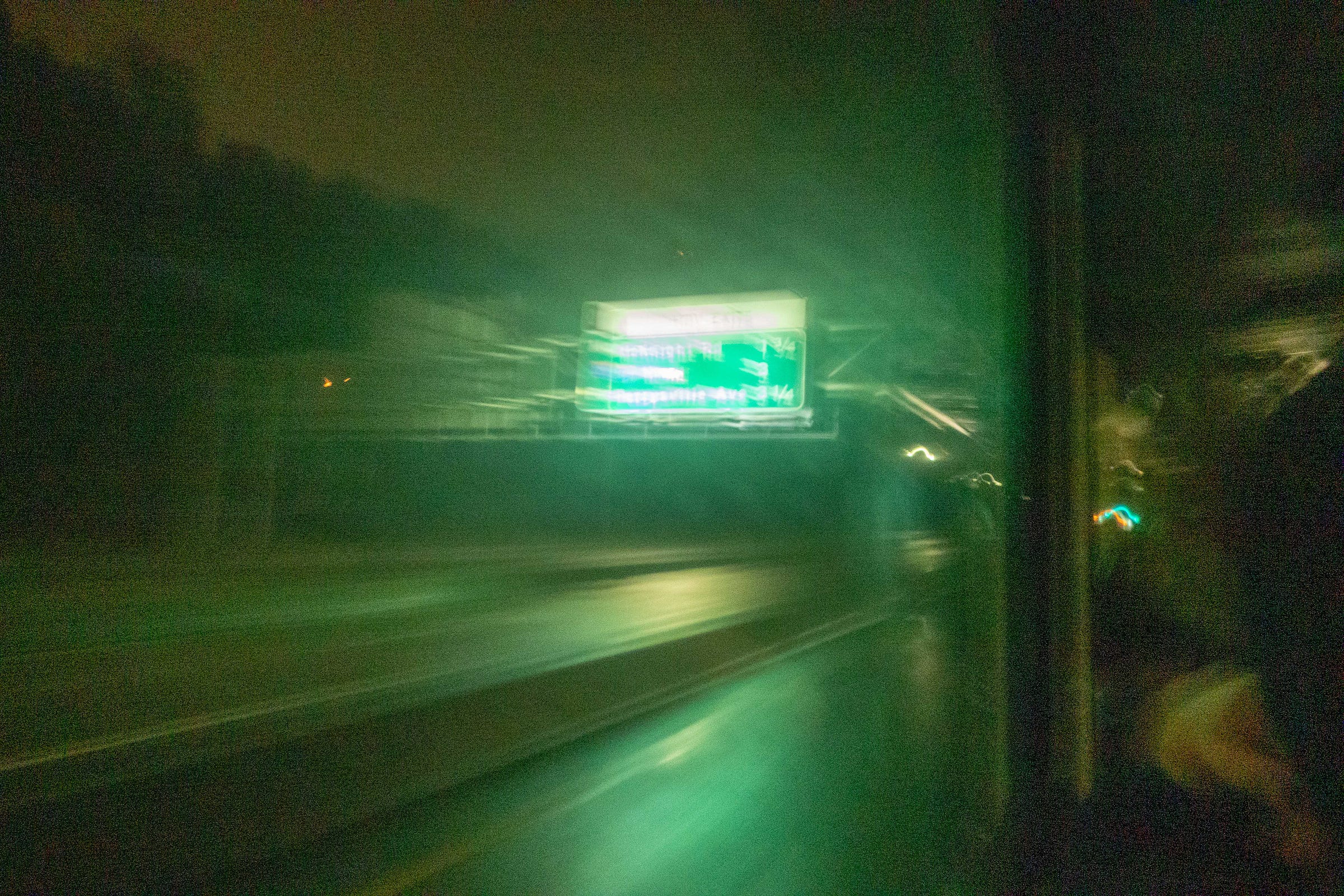
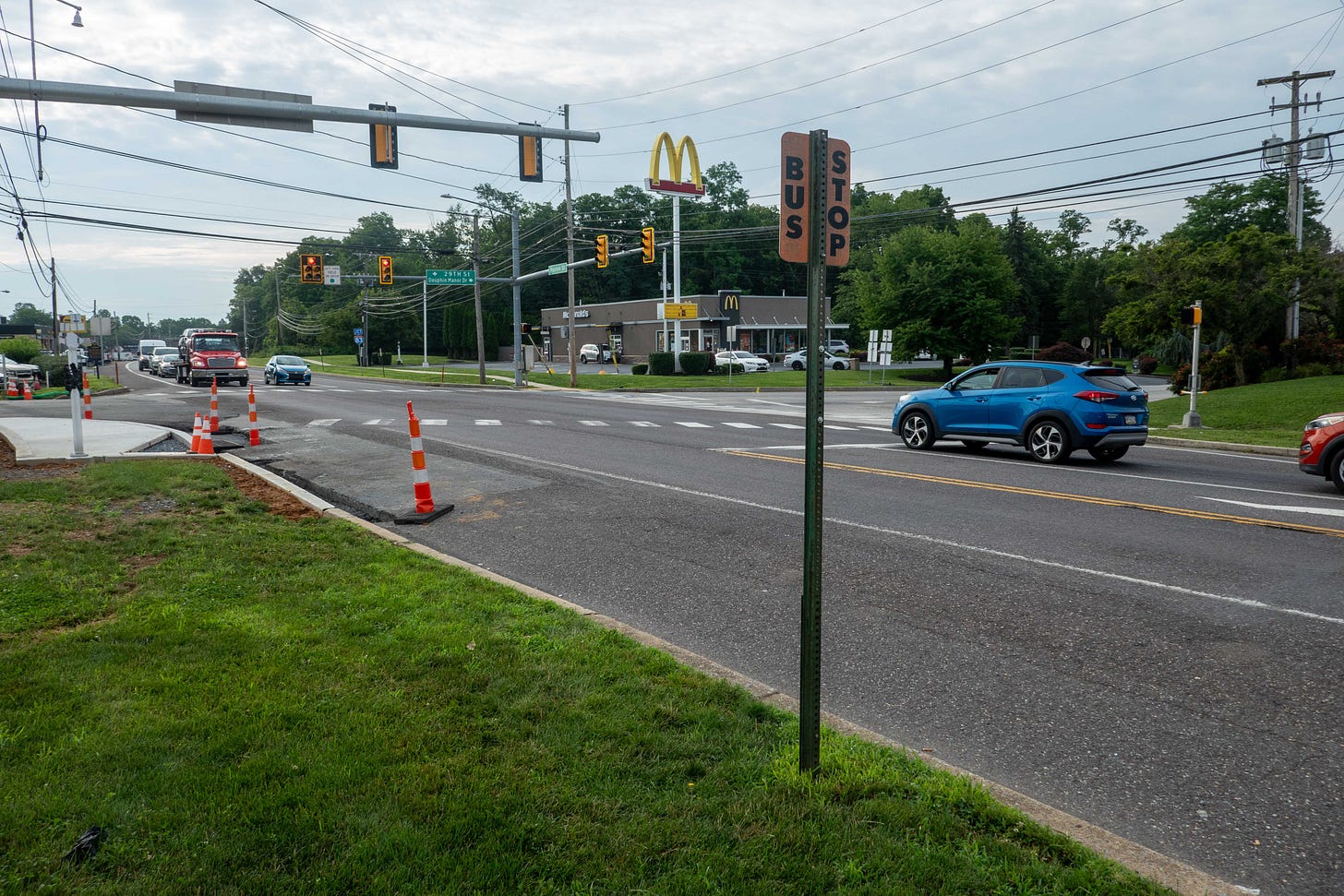

I've been following you for a while but this essay really hit home, as I am currently in Peru (where my wife is from and where Ive lived and made doc films), but for the last eight years lived Bloomington, IN. And acutely aware of the sense that "ours is a cold, individualistic materialistic society, with little direction given beyond accumulating more." I prefer Peru. My wife comes from a working class family, many challenges, but I don't feel lonely.
F
Follow your heart, it always steers you in the right direction. Since I haven’t lived in my native land for decades, your travels there fill me with horror to be honest. America is such a tragedy. It could have been so great if greed and selfishness didn’t overwhelm it. I truly hope you stay safe and don’t encounter ICE along the way. I never want to go back there again, alas.